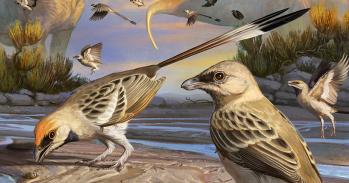
Developments in evolutionary biology have a significant impact on the way we look at the world and ourselves in it, according to a conservation scientist who will be speaking on the subject at Cambridge University’s annual Science Festival.
Developments in evolutionary biology have a significant impact on the way we look at the world and ourselves in it, according to a conservation scientist who will be speaking on the subject at Cambridge University’s annual Science Festival.
When the theory first developed, it was the first time that people realised that they aren’t anything particularly special or unusual; we’re part of everything else.
Ed Turner
Dr Ed Turner, Teaching Officer in Biological Sciences at the University of Cambridge’s Institute of Continuing Education (ICE), is speaking at the UK’s biggest free science festival on March 25, using his lecture to talk about how evolutionary theories have developed over the past 150 years and why evolution is still an important and relevant topic.
In the 18th century, the common belief was that all species were created by God and could not deviate from their original form. However, by the early 1800s, some people were beginning to counter this theory and the idea that species were gradually changing over time was becoming dominant.
Erasmus Darwin wrote in his scientific work Zoonomia: ‘imagine that all warm-blooded animals could have arisen from a single living filament…with the power of acquiring new parts’, foreshadowing the theory of evolution that his grandson, Charles Darwin, later established.
The significance of On the origin of species was the notion that evolution occurred through natural selection – the idea that there is a range of characteristics in living species and that these differences result in variations of survival and reproduction – rather than as a result of divine intervention. For those who accepted this theory, it significantly altered their perception of themselves as a separate species by promoting the concept that humans evolved from the rest of the natural world.
The significance of On the origin of species was the notion that evolution occurred through natural selection – the idea that there is a range of characteristics in living species and that these differences result in variations of survival and reproduction – rather than as a result of divine intervention. For those who accepted this theory, it significantly altered their perception of themselves as a separate species by promoting the concept that humans evolved from the rest of the natural world.
“When the theory first developed, it was the first time that people realised that they aren’t anything particularly special or unusual; we’re part of everything else,” Dr Turner said.
Since the early half of the 20th century, when scientists united Darwin’s theory of evolution and modern genetics, there have been many further advances such as the development of the theory of sexual selection, which explains why individuals of the same species differ in structure, colour or ornament.
Traits such as large antlers and sharp teeth have clearly developed to give males better access to females and to increase survival rate, but ornamental characteristics such as very long tails and elaborately coloured plumes can actually reduce an individual male’s survival.
It has long been thought that these distinguishing features are more appealing to females and so the increase in reproduction compensates for the decrease in survival. However, it was only fairly recently that biologists discovered that the attractiveness of these traits lies in their indication of genetic health – for example greater disease resilience.
It has also been found that competition between males continues after the initial intercourse.
“Scientists discovered that this competition between males doesn’t actually stop with mating – there are all kinds of other selection processes that follow, such as mate guarding or even the use of special plugs that stop a female being able to mate again. Sperm can even compete to access individual eggs, which is absolutely remarkable,” Dr Turner said.
A fruit fly’s sperm contains toxins which affect the behaviour of females – it reduces their desire to mate again. This is important because the last male to mate has the greatest chance of fathering the offspring because many females store the sperm.
Dr Turner added: “After intercourse, the key thing for the male is to prevent her from mating again.”
This idea that animals constantly try to maximise their survival and reproduction is challenged by social insects such as ants and termites. In these communities, the majority of individuals are sterile workers.
“There are different ways of passing on genes to the next generation,” Dr Turner said. “Relative costs and benefits are things we have to think about when discussing kin selection. You don’t actually have to reproduce to pass on your genes – you can just help related individuals to do so.”
Studying evolution is also now regarded as essential when working in areas such as conservation.
Dr Turner concluded: “To understand conservation or any area of biology, I think you must have an understanding of evolution. Realising how species have evolved to use different parts of the environment allows one to predict which groups won’t be able to cope with future changes. Scientists can then work to manipulate environments to preserve species that run the risk of becoming extinct.”
Evolution Revolution will take place at the Cambridge Science Festival on March 25, 10.00am-11.00am at Madingley Hall. It is free and suitable for ages 14+. For anyone who is unable to make the event, the Institute of Continuing Education will publish a video of the talk on their website afterwards.
For further details please visit www.cam.ac.uk/sciencefestival or www.ice.cam.ac.uk/sciencefestival.
This work is licensed under a Creative Commons Licence. If you use this content on your site please link back to this page.





